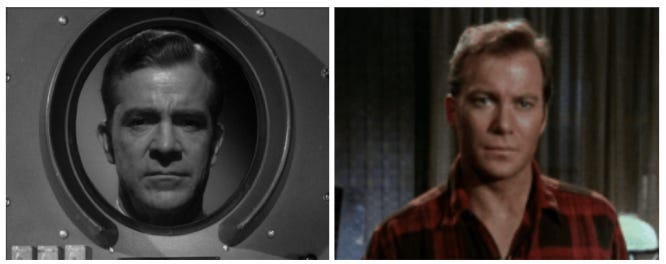Was 'City On The Edge Of Forever', Star Trek’s Most Famous Episode, 'Inspired' By The Twilight Zone?
Before Captain Kirk & Edith Keeler There Was Paul Driscoll & Abigail Sloan of Twilight Zone's “No Time Like The Past”
Among classic Star Trek lore, one episode above so many other worthy installments is not only picked as a fan favorite, but also a chosen favored tale for actors such as William Shatner and even series creator Gene Roddenberry. It’s the Guardian Of Forever fueled time travel epic, City On The Edge Of Forever.
The story revolves around Captain Kirk traveling back in time to depression era America to rescue Dr. McCoy, victim of a debilitating accident, driving him temporarily, violently insane. Along the way, Kirk falls in love with social worker Edith Keeler (Joan Collins) and learns her death is imminent and completely necessary. If he prevents her dying, his timeline changes so drastically, Nazi Germany will win World War II, so all that he knows as a 23rd century Starfleet Officer will cease to exist. Kirk simply has no other logical choice, he must let her perish.
Harlan Ellison, who wrote The City On The Edge Of Forever, had a long and colorful history on being displeased when it came to the way Star Trek producers Gene Roddenberry and D.C. Fontana altered his original script. Although Ellison still won top honor for the telelay at the WGA, his frustration over it led him to pen an emotional essay entitled, "Look Back in Anger", published in a special issue of TV Guide in 1995.
I won’t debate the merits of Ellison’s arguments on his script’s alteration by Roddenberry and Fontana or how colleagues or even Star Trek fans weigh in on the complex subject. What’s intriguing to me is parallels between Ellison’s core story and an episode of TV classic The Twilight Zone, entitled No Time Like The Past, written by Rod Serling. It’s no secret how much Serling’s landmark program influenced later fantasy & sci-fi TV shows and films, but the similarities between these two stories are striking indeed.
Parallel Plot Points
Both revolve around a “man of the future” on an urgent mission – Kirk in Star Trek, Paul Driscoll in Twilight Zone – traveling back in time to a more simplistic period in history. For Kirk it’s America of the 1930’s, for Driscoll it’s America in 1881.
Both involve men falling in love with a non conventional woman of the past. For Kirk it’s Edith Keeler, a muckraker pacifist of a social worker who preaches a better life coming for all mankind in the future. Driscoll’s love is Abigail Sloan a dedicated, outspoken teacher who admires Driscoll’s passionate political views as a pacifist.
Both involve war being central to the plotlines. In Star Trek, it’s the rise of Hitler’s Nazi Germany and pacifist Edith Keeler’s views and rhetoric. In Twilight Zone, it’s pacifist Driscoll’s views, rhetoric and hatred of war, which leads to his time travel.
Both women “sense” their newfound love is from somewhere else. In fact, both have similar dialogue, “You belong somewhere else. Who are you? Where are you from?”
Both men must choose between leaving a “timeline intact” for the good of history over sustaining the romantic love of their newly found beloved women. For Kirk, his decision to leave the timeline intact dooms Keeler to her death, which must happen for the good of all. For Driscoll, upon trying to change the timeline to save his love’s school from a raging fire, he realizes the futility of his actions and that he himself acted as prime cause for the way time ultimately played out.
Both timeline plot devices hinge upon street accidents. For Star Trek, it’s a speeding truck, which mows down Keeler walking across the street. In Twilight Zone, it’s a horse drawn carriage, whose gas lantern becomes a fiery bomb, after it speeds and careens out of control.
Both men return to their respective timelines, both time travellers are incredibly frustrated at the merciless, cruel rivers of eternally passing time, which must flow incessantly to feed the cosmic destiny ocean.
Adding to all the more of a surreal connection between them, a Star Trek comic book published in 1978 as a sequel to City On The Edge of Forever is entitled No Time Like The Past. Also, for the 1980’s television remake of The Twilight Zone, Harlan Ellison wrote several stories and also acted as a creative consultant.
Ellison, who passed away in 2018, was always a tough fighter and fought hard and publicly to protect his intellectual property. After filing a lawsuit, Ellison’s name was added to the credits of James Cameron’s sci-fi thriller, The Terminator, claiming his various time travel ideas and specific android tech was ripped off by director Cameron.
Like so many sci-fi fans, I love Star Trek’s fabled City On The Edge of Forever. Each time I watch the episode, I notice something else and appreciate it all the more. It’s the quintessential Trek, mixing heady sci-fi concepts with touching emotion in perfect balance. I also love The Twilight Zone whose pioneering morality, scifi and fantasy tales paved a way for Star Trek, plus much of modern science fiction and fantasy. All are lasting tributes to the creative talents of Rod Serling, Gene Roddenberry and Harlan Ellison. Nevertheless, it’s fascinating to see how much Ellison either borrowed from or was somewhat creatively inspired by a Twilight Zone Rod Serling wrote in 1963 - a full four years prior to crafting one of history’s most popular and enduring Trek tales.
Watch Harlan Ellison’s legendary Star Trek tale and compare it to Rod Serling’s Twilight Zone episode, No Time Like The Past. Judge for yourself. Should Serling’s name be added to City On The Edge Of Forever credits?
You decide.






Great job Will! Succinct to the point. And yet very entertaining to read. I love the pictures in the article also very fun! Harlan Would be proud!